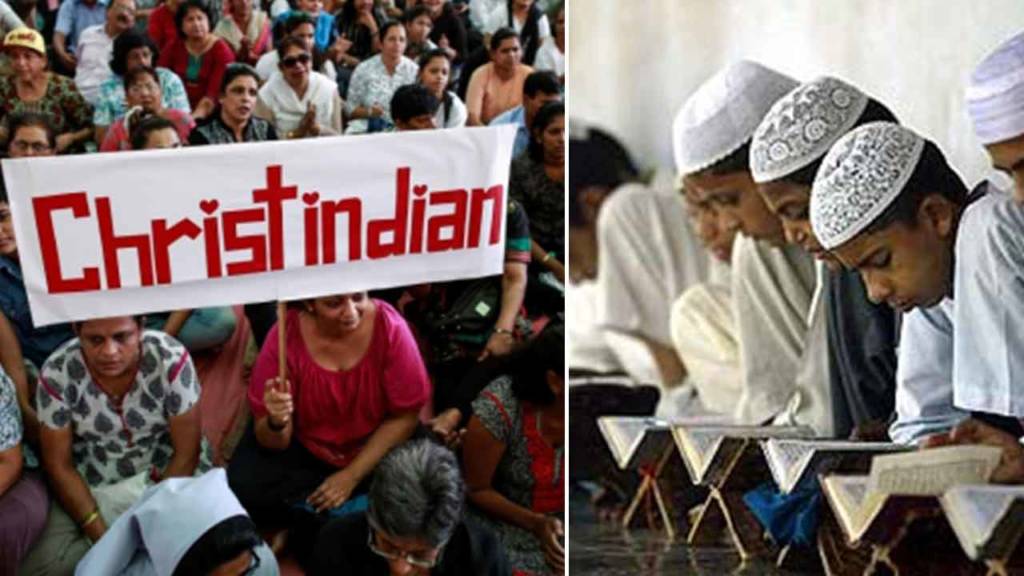Many have put forward their discomfort with the Modi government for the constitutional exemptions which have been granted to minority educational institutions, making them immune to any welfare and policy decisions brought in by any government. One such exemption is the inapplicability of the Right to Education Act, 2009 (officially the Right of Children to Free and Compulsory Education Act, 2009) which was brought in by the UPA government. The other point of contention is that minority-run educational institutions are heavily biased towards students of other communities, and often have a very less number of seats allotted to them. Further, these institutions have no reservations for poor children. But this is soon about to change.
While there have been minor criticisms of the RTE Act, it has been hailed as the UPA’s major achievement in reforming the education system of India. Again, these reforms have not reflected in madrassas and missionary schools. As a result, the Modi government now, as reported by The Indian Express, has initiated an exercise to study the benefits of exempting such institutions from the purview of the RTE. The massive study has been funded by the Human Resources Development Ministry and is being carried out by the National Commission for Protection of Child Rights through various private agencies.
The RTE describes the modalities of the importance of free and compulsory education for children between the age of 6 to 14 years in India under Article 21A of the Indian Constitution. India is among a select few nations since 2010 to have considered education as a fundamental right for its citizens. It requires all private schools (except the minority institutions) to reserve 25% of seats for the poor and other categories of children. Further, according to this Act, no child can be held back in any class during elementary education. It also keeps a check on the practise of flamboyantly raising fees by private schools, except again, minority institutions. In 2011, a decision was taken in principle to extend the right to education till Class X (age 16) and into the preschool age range.
A largely debated constitutional provision is Article 30(1) which gives minority communities to run and administer educational institutions in whichever way they please. As such, which students are to be admitted, what fee structure is to be followed, what proportion of various communities is to be maintained (specifically in Missionary school) is all left to the discretion of these institutions.
Article 30(1) further provides immunity to these schools from Article 15(5), according to which private and government unaided education institutions too were brought under the ambit of reservations. “The NCPCR and the SCPCRs in their observation have seen that while missionary schools deny admission to poor students using the constitutional provision, the number of Christian students in those schools is limited and therefore the rationale behind Article 15 (5) to exempt minority institutions from reservation in order to conserve their language, script and culture is not getting fulfilled,” The Indian Express quoted a senior official in the child rights body as saying.
Now, Article 21(A), which was inserted by The Constitution (Eighty-sixth Amendment) Act, 2002 in order to provide free and compulsory education to all children from 6 to 14 years of age and further recognize education as a fundamental right, is not applicable to minority-run schools. Article 21(A) was brought into action by the Right to Education Act, 2009. However, when the question of minority institutions arises, it is seen that Article 30(1) overrules Article 21(A) and the RTE, which enforce education as a fundamental right. Since a fundamental right is being superseded by Article 30(1) in order to provide immunity to minority institutions, it is only befitting to let Article 21(A) prevail and RTE to be implemented across the nation, even in madrassas and missionary schools.
The government has showed the spine to tread over this sensitive territory, as Article 30(1) and the issue of minority institutions’ autonomy has always been considered a holy cow, not to be ever brought under question. With the government now studying whether at all the absence of reservations and RTE is proving beneficial to the students of such institutions (which it is definitely not), it is being expected that they would soon let a fundamental right prevail, and would scrap the exemption granted to these institutions. If so, the Modi government would have broken a big status-quo, only for the betterment of India’s children, especially the underprivileged, who could only dream of studying at missionary schools thus far.
